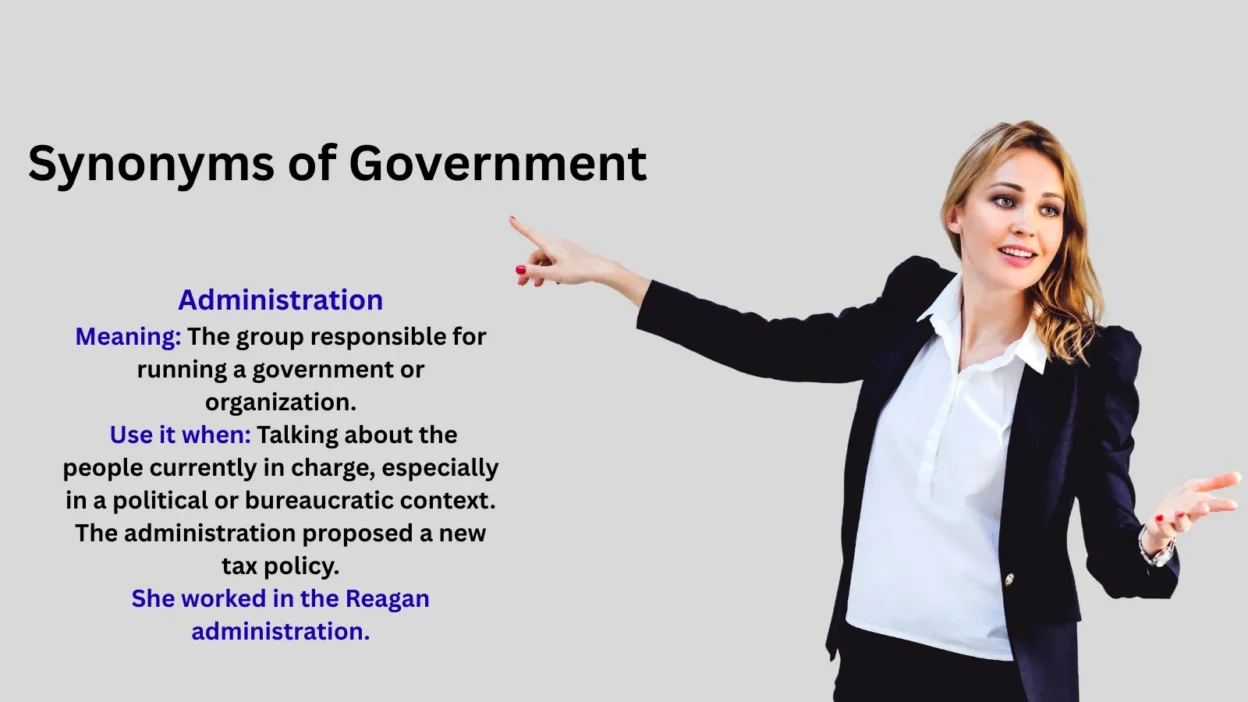The word government refers to the system or group that leads, rules, or manages a country, state, or community. It can describe the people in power, the structure they use, or the act of governing itself. But sometimes, the word feels overused or too formal, and you may want a fresh way to say it. That’s when knowing synonyms of government can help.
In this guide, you’ll find simple and useful alternatives to government, from words like administration and authority to leadership and regime.
Each synonym has its own meaning and tone, so you can pick the one that best fits your writing or speech.
What Does Government Really Mean?
At its core, government means the body or system that manages public affairs, laws, and institutions of a state or community. This can refer to national leadership, local administration, or broader structures of authority.
Examples:
- The government passed a new environmental law.
- Local government officials responded quickly to the crisis.
Synonyms of Government (With Usage Tips and Examples)
1. Administration
Meaning: The group responsible for running a government or organization.
Use it when: Talking about the people currently in charge, especially in a political or bureaucratic context.
- The administration proposed a new tax policy.
- She worked in the Reagan administration.
2. Regime
Meaning: A government, especially an authoritarian one.
Use it when: Referring to leadership with strong or oppressive control.
- The military regime lasted over a decade.
- Sanctions were imposed on the regime.
3. Authority
Meaning: The power or right to give orders and enforce rules.
Use it when: Emphasizing control or legitimacy.
- The authority of the central government was questioned.
- Local authorities issued an evacuation order.
4. State
Meaning: The political organization of a country.
Use it when: Referring to a nation’s institutional and legal framework.
- The state has a duty to protect its citizens.
- They work for the state rather than private firms.
5. Cabinet
Meaning: A group of senior government officials who advise the leader.
Use it when: Talking about executive leadership, especially in parliamentary systems.
- The cabinet met to discuss defense strategy.
- A cabinet reshuffle is expected soon.
6. Administration
Meaning: A managerial or organizational body.
Use it when: Describing the structure behind government operations.
- The administration must streamline healthcare delivery.
- Education administration varies by district.
7. Leadership
Meaning: The individuals who guide or direct a group.
Use it when: Focusing on personal direction or influence.
- The leadership was praised for its quick response.
- New leadership brought reforms.
8. Ruling party
Meaning: The political party currently in power.
Use it when: Referring to democratically elected leadership.
- The ruling party announced new economic plans.
- Protests challenged the ruling party’s policies.
9. Council
Meaning: An elected or appointed body that governs a local area.
Use it when: Talking about city, regional, or tribal governance.
- The town council voted unanimously.
- A tribal council manages local affairs.
10. Parliament
Meaning: A legislative body that makes laws in many countries.
Use it when: Discussing lawmaking in parliamentary systems.
- Parliament passed the climate bill.
- She’s a member of Parliament.
11. Congress
Meaning: The legislative branch in certain democratic systems (e.g., the U.S.).
Use it when: Talking about national lawmaking bodies.
- Congress debated the new budget proposal.
- Approval by Congress is required.
12. Legislature
Meaning: The body that creates laws.
Use it when: You need a more general term for lawmakers.
- The legislature reconvenes in the fall.
- State legislatures are passing stricter laws.
13. Sovereign
Meaning: A supreme ruler or independent governing body.
Use it when: Referring to absolute authority or self-rule.
- The nation regained its sovereign rights.
- A sovereign state controls its borders.
14. Council of Ministers
Meaning: The Top governmental body in parliamentary or mixed systems.
Use it when: Referring to executive bodies outside the U.S.
- The Council of Ministers approved the reforms.
- Policies are coordinated through the council.
15. Chancellery
Meaning: The office or government of a chancellor.
Use it when: Discussing German or European governmental structures.
- The chancellery announced the new policy.
- A shift in the chancellery could alter alliances.
16. Ministry
Meaning: A department within a government.
Use it when: Referring to specific government functions.
- The Ministry of Health issued new guidelines.
- She works for the Ministry of Education.
17. Executive
Meaning: The branch of government that enforces laws.
Use it when: Talking about decision-making power.
- The executive issued an emergency order.
- There’s a conflict between the executive and the judiciary.
18. Civil Service
Meaning: The permanent bureaucracy of the government.
Use it when: Referring to career officials, not elected leaders.
- The civil service ensures continuity.
- He joined the civil service after graduation.
19. Bureaucracy
Meaning: A complex system of government officials.
Use it when: Emphasizing structure, paperwork, or red tape.
- The bureaucracy slowed down progress.
- Navigating the bureaucracy was frustrating.
20. Establishment
Meaning: The traditional power structure.
Use it when: Critiquing entrenched authority.
- The establishment resists change.
- He campaigned against the political establishment.
21. Regency
Meaning: A government run by a temporary leader.
Use it when: Describing a rule during a monarch’s absence or minority.
- The regency lasted until the king came of age.
- A regency was established during the crisis.
22. Command
Meaning: Control, especially in military or centralized contexts.
Use it when: Emphasizing directive authority.
- The general had command of the region.
- Emergency command centers were activated.
23. Dominion
Meaning: Self-governing territory under a larger empire.
Use it when: Discussing historical colonial relationships.
- Canada was once a British dominion.
- The dominion sought independence.
24. Council of Elders
Meaning: A traditional governing body in tribal societies.
Use it when: Referring to indigenous or local cultural systems.
- The Council of Elders made the decision.
- Tribal law is enforced by the council.
25. Directorate
Meaning: A body of directors, often in a revolutionary or temporary regime.
Use it when: Talking about transitional governments.
- The directorate replaced the monarchy.
- A military directorate took control.
26. Commonwealth
Meaning: A political community founded for the common good.
Use it when: Referring to a cooperative or voluntary association.
- The Commonwealth of Nations shares democratic values.
- Pennsylvania is a commonwealth.
27. Empire
Meaning: A group of states under a single ruler.
Use it when: Talking about historical or powerful states.
- The Roman Empire controlled much of Europe.
- Colonial empires shaped modern borders.
28. Confederation
Meaning: A union of states with a weak central government.
Use it when: Describing loosely bound political systems.
- The confederation gave too much power to the states.
- A confederation of leagues defended the region.
29. Federation
Meaning: A political system with shared power between central and regional governments.
Use it when: Describing systems like the U.S. or Germany.
- The federation allows state-level autonomy.
- Russia is a federation of republics.
30. Principality
Meaning: A territory ruled by a prince.
Use it when: Referring to small or symbolic monarchies.
- Monaco is a principality.
- The principality maintained cultural independence.
How to Choose the Right Government Synonym
1. Use based on structure or system:
- Federation, confederation, state, bureaucracy
2. Use based on leadership style:
- Regime, cabinet, directorate, chancellery
3. Use for cultural or traditional contexts:
- Council of Elders, regency, dominion
4. Use in a critical or informal tone:
- Establishment, regime, bureaucracy
5. Use for international or historical discussions:
- Empire, commonwealth, principality
Conclusion:
The word government is common, but it is not your only choice. By using synonyms of government like administration, authority, leadership, or regime, you can make your language clearer and varied. Each synonym brings a slightly different tone—some sound formal, while others feel neutral or even critical.
Choosing the right word helps you match your message to the context. With these synonyms, you can write or speak with more power, precision, and style. They also help you avoid repetition and keep your writing fresh. The more you practice with these options, the more natural they will become in your everyday use.





